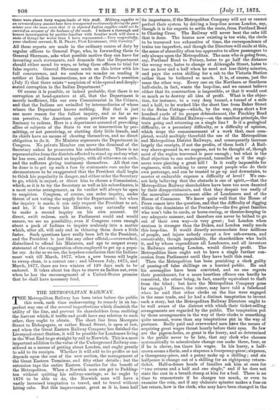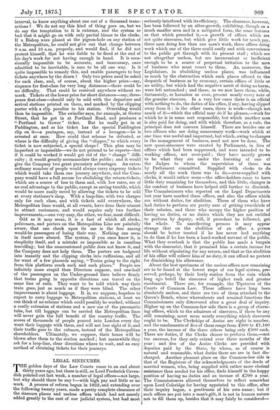THE METROPOLITAN RAILWAY.
THE Metropolitan Railway has been twice before the public this week, each time endeavouring to remedy in an im- perfect way one of the several imperfections which diminish the utility of the line and prevent its shareholders from realising the harvest which, if traffic and profit have any relation to each other, they ought to obtain. The short line from Moorgate Street to Bishopsgate, or rather Broad Street, is open at last, and when the Great Eastern Railway Company has finished the Liverpool-street Station, it will be possible for Londoners living in the West End to go straight by rail to Norwich. This is a most important addition to the value of the Underground Railway con- sidered as a means of getting about London, and ought greatly to add to its receipts. Whether it will add to its profits or not depends upon the cost of the new section, the management of the Great Eastern Terminus, and fifty other details ; but the extension taps the entire Eastern Counties for the benefit of the Metropolitan. When a Norwich man can get to Padding- ton without quitting his railway-carriage, as he ought by 1876 to be able to do, the Norwich man will have a vastly increased temptation to travel, and to travel without hiring cabs. But this improvement, great as it is, loses half its importance, if the Metropolitan Company will not or cannot perfect their system by driving a loop-line across London, say, though it is for experts to settle the route, from Portland Road to Charing Cross. The Railway will never beat the cabs till that is done. The hiatus now existing is too wide, the circle to be traversed too exhaustive of time, the correspondence of trains too imperfect, and though the Directors will smile at this, the sense of absurdity often too oppressive to allow passengers to rely always upon the Metropolitan. The man who is going from, say, Portland Road to Putney, hates to go half the distance the wrong way, hates to change at Aldersgale Street, hates to lose an hour and a half when he need not lose thirty minutes, and pays the extra shilling for a cab to the Victoria Station rather than be bothered so much. It is, of course, just the same the other way. Every one on the Northern or Southern half-circle, in fact, wants the loop-line, and we cannot believe either that its, construction is impossible, or that it would cost so much as to destroy all idea of profit. What is the objec- tion, for instance, to a very deep tunnel, a tunnel of a mile and a half, to be worked like the short line from Baker Street to the Swiss Cottage—which, by the way, stops short a few hundred yards of its proper debouchement, the Finchley Road Station of the Midland Railway—on the omnibus principle, the train going and returning on a single line ? Is it a geological difficulty, or a pecuniary difficulty, or a difficulty of opinion, which stops the commencement of a work that, once com- pleted, would multiply threefold the use of the Metropolitan and Metropolitan District Railways, and consequently increase largely the receipts, if not the profits, of them both? A Rail- way above-ground is, we suppose, not to be thought of, though most of the region traversed is poor enough ; but what is the final objection to one under-ground, tunnelled as if the engi- neers were piercing a great bill? Is it really impossible for engineers, with nothing to carry except people who do their own porterage, and can be trusted to go up and downstairs, to master at endurable expense a difficulty of level We can- not help believing that the obstacle is one of spirit,—that the Metropolitan Railway shareholders have been too soon daunted by their disappointments, and that they despair too easily of the masculine common-sense alike of Londoners and of the House of Commons. We know quite well that the House of Peers comes into the question, and that the difficulty of digging within the dominions of the Pentarchy—the five great families who won't take to cards, or horse-racing, or theatre-keeping in any adequate manner, and therefore can never be bribed to go out of their own way—is very great ; but London when anxious is stronger than the Dukes, and London really needs this loop-line. It would directly accommodate four millions of people, and injure nobody except a few cab-owners, and conceivably, though improbably, the shareholders who built it, and by whose expenditure all Londoners, and all investors in Railways entering London, would directly profit. The Metropolitan lines ought not to have a single further con- cession from Parliament until they have built this road.
Then the Metropolitan has been punishing a clerk guilty of passing-off false shillings on a hurried public. He and his accomplice have been convicted, and no one regrets their punishment, for a more heartless offence can hardly be conceived, the crime being, in fact, exactly equivalent to theft from the blind ; but have the Metropolitan Company gone far enough ? Neave, the coiner, may have told a falsehood when he said that other clerks on the line were engaged in the same trade, and he had a distinct temptation to invent such a story, but the Metropolitan Railway Directors ought to be well aware of the distrust with which their ticket-selling arrangements are regarded by the public. The temptation put by those arrangements in the way of their clerks is something quite unusual, worse than any temptations put inthe way of postmen. Badly paid and overworked men have the means of acquiring great wages thrust hourly before their eyes. So few are the pigeon-holes, so great is the hurry, and so determined is the public never to be late, that any clerk who chooses systematically to miscalculate change can make three, four, or if he is clever, ten times his wages. In his hurry, a half- crown seems a florin, and a sixpence a fourpenny-piece ; sixpence, a threepenny-piece, and a penny make up a shilling ; and six halfpence is change out of a shilling for an eightpenny return- ticket. Half-a-dozen heads of families ask him at once for "two returns and a half and one single," and if he does not state the cost in a breath stamp at him for a fool. There is no time to remonstrate if he charges too much, or even to examine the coin, and if any obdurate spinster makes a fuss on her return, how is the clerk, who may have been changed in the interval, to know anything about one out of a thousand trans- actions ? We do not say this kind of thing goes on, but we do say the temptation to it is extreme, and the system so bad that it might go on with only partial blame to the clerks. If a Bishop were placed at the pigeon-hole on any station of the Metropolitan, he could not give out that change between 9 a.m. and 10 a.m. properly, and would find, if he did not protect himself, that he was liable to be fined at the end of his day's work for not having enough in hand. It is occa- sionally impossible to be accurate, and inaccuracy, once admitted to be inevitable, is sure to be all one way. Is it quite impossible to remedy this, and enable passengers to buy tickets anywhere by the dozen ? Only two prices need be asked , for each class, and, of course, about the higher price—say, sixpence for first-class for very long distances—there could be no difficulty. That could be received anywhere without re- mark. Tickets at the lower price for short distances—say, three- pence first-class—should only be sold with the departure and arrival stations printed on them, and marked by the clipping porter with a clip peculiar to his station. Overriding would then be impossible. The swindler says, for example, at Gower Street, that he got in at Portland Road, and produces a "Portland to (lower" ticket. But he really got in at Paddington, and as his ticket has the special Paddington clip on it—a pentagon, say, instead of a hexagon—he is arrested at once. How could that scheme be defeated, or where is the difficulty of giving the "clipper," to which every ticket is now subjected, a special shape ? This plan may be imperfect or impossible—we do not pretend to be experts—but if it could be worked it would get rid of the " change " diffi- culty; it would greatly accommodate the public ; and it would give the Company two great pecuniary advantages. An extra- ordinary number of people would always carry sixpenny tickets which would take them one journey anywhere, and the Com- pany would have a full excuse for abolishing the return-tickets, which are a source of loss to them and, with low rates, are of no real advantage to the public, except as saving trouble, which would be more easily saved by allowing the tickets to be sold at every stationer's shop. With a loop-line, with two charges only for each class, and with tickets sold everywhere, the Metropolitan lines would, at all events, have done their utmost to attract customers, and would require only two further improvements,—one very easy, the other, we fear, most difficult.
Odd as it may seem, it is a fact of which all clerks, policemen, and porters on the Metropolitan Line are painfully aware, that one check upon its use is the fear among would-be passengers of losing their way. Nothing can seem in itself more absurd. The system, if you once know it, is simplicity itself, and a mistake as impossible as in omnibus travelling; but the unaccustomed public does not know it, and the Company does not help them. The porters are badgered into insanity and the clipping clerks into ruffianism, and all for want of a few placards saying, Trains going to the right from this platform reach such and such places." People are infinitely more stupid than Directors suppose, and one-half of the passengers on the Under-ground lines believe firmly that trains going in opposite directions can travel on the same line of rails. They want to be told which way their train goes, just as much as if they were blind. The other improvement is about luggage. It is, we suppose, hopeless to expect to carry luggage to Metropolitan stations, at least we can think of no scheme which could possibly be worked, without a costly extension of stations and a new use of the pneumatic tube, but till luggage can be carried the Metropolitan lines will never gain the full benefit of the country traffic. The scores of thousands of people poured into London every day want their luggage with them, and will not lose sight of it, and their traffic goes to the cabmen, instead of the Metropolitan shareholders. Ultimately, we suppose, their boxes will be blown after them to the station marked ; but meanwhile they ask for a loop-line, clear directions where to wait, and an easy method of obtaining tickets for their journeys.



































 Previous page
Previous page